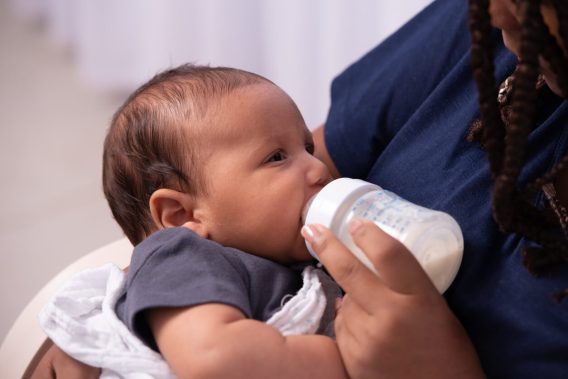Unsafe Feeding Methods Spiked During U.S. Baby Formula Shortage
Editors carefully fact-check all Drugwatch content for accuracy and quality.
Drugwatch has a stringent fact-checking process. It starts with our strict sourcing guidelines.
We only gather information from credible sources. This includes peer-reviewed medical journals, reputable media outlets, government reports, court records and interviews with qualified experts.

A study conducted by researchers at the University of California, Davis in the middle of the 2022 infant formula crisis found that many U.S. parents resorted to unsafe feeding methods due to a lack of formula.
Results of the anonymous survey, published in June, found that 50% of the 99 parents surveyed acted out of desperation when faced with the shortage of baby formula. That number is much higher than the 8% of parents who practiced unsafe feeding methods before the shortage.
Those feeding methods included:
- Informal sharing of human milk
- Using expired formula
- Using homemade formula
- Watering down formula
The survey took place in the midst of the baby formula shortage, between May 25, 2022, and June 7, 2022. The most dramatic increases were cases of parents diluting formula with water.
The data shows that 29% of parents said they watered down their child’s formula, which is up from 2% before the shortage. Also, 26% of parents surveyed admitted sharing milk. That number is up from 5%.
Researchers said they heard troubling stories from parents about the different ways they attempted to obtain baby formula. Some said family members sent them formula from other states. Others said they traveled to several stores in hopes of finding formula on the shelves.
“I think it opened a lot of eyes and instilled a lot of fear in families who just couldn’t believe that their hands were shackled and they didn’t have a lot of options,” Jennifer Smilowitz, study co-author and faculty affiliate with the UC Davis Department of Food Science and Technology, told Early Learning Nation magazine. “You could hear the terror in these parents and the fear and the anguish. It was so palpable.”
Unsafe Feeding Facts
Infants need a specific balance of nutrients to properly grow and can be harmed through unsafe feeding methods, according to Abrie McCoy, an international board-certified lactation consultant for SimpliFed, an infant feeding support organization. Diluting baby formula with water can be especially dangerous. Not only are infants not getting all the nutrients they require, but they may also be getting more water than they need.
“When we dilute formula, that actually changes the nutritional components of what the child is getting for that feeding,” McCoy said. “If the formula is dose-dependent, the amount of formula mixed in with the water is going to create the perfect balance of hydration and nutrition for the baby.”
Another unsafe practice, using expired formula, could mean that nutrients have degraded. This can interfere with proper infant growth. Sharing human milk is also risky since the donor milk isn’t pasteurized and can introduce unnecessary health and safety risks, according to experts. Donor milk banks are a much safer option.
2022 U.S. Baby Formula Shortage
The 2022 baby formula shortage was caused by a combination of supply chain issues during the COVID-19 pandemic and a major recall of formula by Abbott Nutrition. The company supplies about 40% of the nation’s baby formula. The voluntary recall of formula was caused by contamination with Cronobacter and Salmonella newport bacteria.
Abbott Nutrition closed its Michigan plant for about four months after two infants died and several others were sickened by formula tainted with the bacteria. The U.S. Food and Drug Administration found several problems at the plant. That led to new guidelines, studies and regulations.
Many parents have also filed lawsuits against the makers of cow’s milk baby formula over the risks of necrotizing enterocolitis, a serious intestinal disorder that can affect some premature infants.
In May, the FDA began an independent study into the baby formula industry in hopes of making improvements in the future. A month later, Cronobacter was added to the Centers for Disease Control and Prevention’s National Notifiable Diseases Surveillance System.
This means bacterial infections associated with it will be formally tracked by the CDC. States will now be asked to notify the CDC of any Cronobacter infections. The new rule goes into effect in 2024.